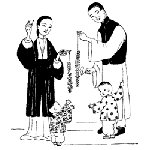Qingming Festival (Tomb Sweeping Day) Date in the current year: April 5, 2026
 The Qingming Festival, also known as Tomb Sweeping Day, is a traditional Chinese festival observed on the 15th day after the Vernal Equinox, which corresponds to April 4, 5 or 6 in the Gregorian calendar. It is a public holiday in mainland China, Taiwan, Hong Kong, and Macau.
The Qingming Festival, also known as Tomb Sweeping Day, is a traditional Chinese festival observed on the 15th day after the Vernal Equinox, which corresponds to April 4, 5 or 6 in the Gregorian calendar. It is a public holiday in mainland China, Taiwan, Hong Kong, and Macau.The roots of the Qingming Festival can be traced back to the ancient Cold Food Festival (Hanshi). The Hanshi Festival was established in the 7th century BC to commemorate the death of Jie Zhitui, a Han aristocrat who served Prince Chong’er during his exile. He famously saved the starving prince’s life by cutting a chunk of meat from his own thigh to cook his lord some soup.
When Chong’er was enthroned as Duke of Jin, he decided to find Jie, who had left to live a secluded life in the forest near Mount Mian, and reward him for his loyalty. Jie didn’t want to come back to court, so he ignored the duke’s invitations. To force Jie out, the duke ordered to start a forest fire. However, Jie didn’t come out and was burned alive together with his elderly mother.
When the duke realized what he had done, he renamed the mountain after Jie, founded the city of Jiexu at its foot, erected a temple in Jie’s honor, and inaugurated the Hanshi festival as a memorial period for his loyal servant. During the festival, people avoided the lighting of fire, even to prepare food, hence the name “Cold Food Festival”.
Originally, the Cold Food Festival was celebrated in midwinter and lasted for a month. However, the practice of not lighting fires for so long during the cold season was very dangerous for children and the elderly. After several unsuccessful attempts to ban the festival local rulers shortened it to just three days and moved the celebration to mid-spring.
Over the years, the Cold Food Festival has been transformed into the present-day Qingming Festival dedicated to remembering ancestors. In English, the festival is usually referred to as Tomb Sweeping Day, Chinese Memorial Day or Ancestors’ Day. During the festival, Chinese families visit the graves of their relatives to clean and sweep grave sites, worship their ancestors, make ritual offerings of food and burn joss paper.
In mainland China, the festival is associated with qingtuan, a type of dumpling made of glutinous rice and filled with sweet bean paste. The rice is mixed with barley grass or Chinese mugwort, giving it a bright green color. Qingtuan is hard to make and the grass it’s made with is only edible in spring, so it is cooked exclusively for the Qingming Festival.
The Qingming Festival has been observed by the Han Chinese for more than 2.5 millennia. It was declared as a public holiday in mainland China in 2008. In Taiwan, it used to always be observed on April 5 to commemorate the death anniversary of Chaing Kai-shek, a Taiwanese military leader and politician. However, when his party fell out of power, the association between Chaing Kai-shek’s death anniversary and the Qingming Festival ceased to exist. In present-day Taiwan, the holiday is observed on the same day as in mainland China, depending on the date of the Spring equinox.
- Category
- Public Holidays, Cultural Observances, Folk Festivals
- Country
- China, Hong Kong, Macau, Taiwan
- Tags
- Qingming Festival, Tomb Sweeping Day, Hanshi Festival, Cold Food Festival, Chinese festivals, public holidays in China